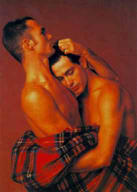
How do the rich and powerful justify their position in society to the people who they rule? That question is at the heart of this book. Ruling classes have, since ancient times tried to justify their wealth and privilege by variously proving their links to some great previous ruler, or showing that they play an important role, without which society would be plunged into disarray.
Some of humanity’s oldest written records are “King Lists” – attempts to prove a monarch’s linage back to ancient times (and often the Gods). Julius Caesar for instance claimed the goddess Venus as an ancestor.
This book documents modern attempts by the establishment to both justify the position of the rulers over the ruled (the modern monarchy in England for instance, or colonial rule of India and Africa). It also shows how the same establishment (or individuals with an interest in doing so) create an invented tradition, both to glorify some mythical past, or to create an artificial image of a people or nation.
 This last bit, includes for instance, the conscious creation of the myth of the Scottish Highlands (tartan in particular). The chapters dealing with this are very interesting, but where the book really excels is the description of the establishments attempts to turn the monarchy into something both relevant to modern times and to help reinvent the idea of national interest.
This last bit, includes for instance, the conscious creation of the myth of the Scottish Highlands (tartan in particular). The chapters dealing with this are very interesting, but where the book really excels is the description of the establishments attempts to turn the monarchy into something both relevant to modern times and to help reinvent the idea of national interest.Some of this stuff is brilliant. From Victoria’s complete lack of interest in pageantry and her role in state ritual, to the description of Disraeli “obliged to sit on his wife’s lap” at the Prince of Wales’ wedding as the event was so ill prepared.
The chapter continues with a description about how future royal weddings (and funerals) became deeply organised and choreographed to show the monarchy in the best light – the increased involvement of the media was part of this process.
The book finishes with several chapters which look at how other traditions have been invented (including for instance, the less conscious invention of the May Day celebration of the left, and various sports traditions). On the whole, these chapters aren’t as interesting as the chapters on the lengths that the establishment will go to, to try and make us feel part of their family. But it’s all well worth a read.
No comments:
Post a Comment